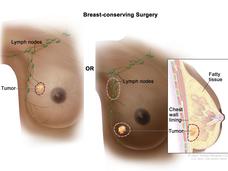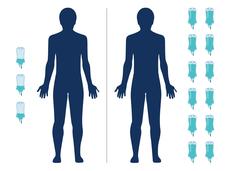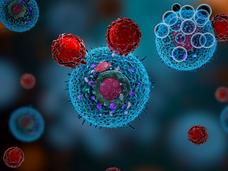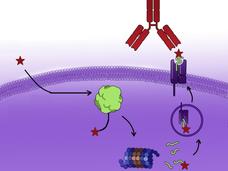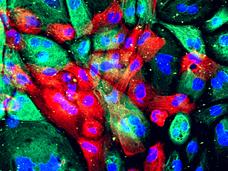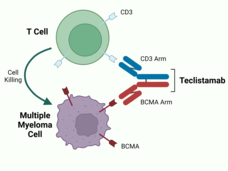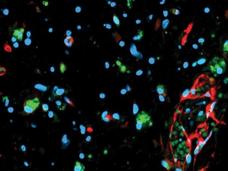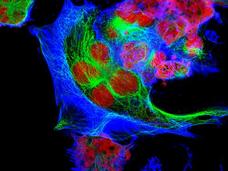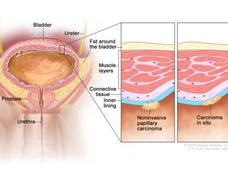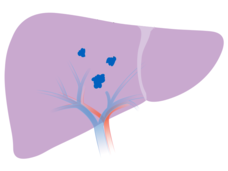Cancer Currents: An NCI Cancer Research Blog
A blog featuring news and research updates from the National Cancer Institute. Learn more about Cancer Currents.
-
Shorter Course of Radiation Is Effective, Safe for Some with Early-Stage Breast Cancer
In a large clinical trial, a condensed course of radiation therapy was as effective and safe as a longer standard course for those with higher-risk early-stage breast cancer who had a lumpectomy. This shorter radiation course makes treatment less of a burden for patients.
-
Cancer Screening Guidelines Often Lack Information on Potential Harms, Study Finds
In a review of 33 cancer screening guidelines, researchers have found that many don’t adequately capture the potential harms of cancer screening. Providing information on harms is critical so people can have informed discussions about screening with their health care providers, the researchers noted.
-
Study in India Could Make Immunotherapy More Affordable Worldwide
A study in India has found that an ultra-low dose of the immunotherapy drug nivolumab (Opdivo) helped people with advanced head and neck cancer live longer. Because the dose is 6% of what’s typically used in the United States and Europe, it is potentially more affordable.
-
“Oncometabolite” Neutralizes Immune Cells Near Tumors
In a new study, researchers showed that cancer cells with mutations in the IDH1 gene release large amounts of a metabolite called D-2HG. Once outside of the cells, D-2HG acts like force field by neutralizing nearby immune cells.
-
COVID-19 Vaccines Are Safe for People Receiving Cancer Immunotherapy, Study Confirms
mRNA COVID-19 vaccines did not increase the type, frequency, or severity of immune-related side effects among people taking immune checkpoint inhibitors to treat cancer, a study at Memorial Sloan Kettering Cancer Center found. CDC and other medical groups generally recommend that people with cancer receive an mRNA COVID-19 vaccine.
-
Changing the Perception of Early-Phase Cancer Clinical Trials: A Conversation with Dr. Naoko Takebe
The number of participants in modern phase 1 cancer clinical trials whose cancer responded to the treatment or remained stable has increased substantially, while treatment-related deaths remained very low, a new NCI study shows. Dr. Naoko Takebe discusses the findings and the importance of phase 1 trials.
-
Preventing Chemo Brain? Study Identifies Potential Approach for Common Problem
Cisplatin raises levels of a fat molecule called S1P in areas of the brain responsible for memory and information processing, a new study shows. S1P locks onto a protein on the surface of brain cells called S1PR1. In mice given cisplatin, drugs that block S1PR1 prevented cognitive problems.
-
Can Targeted Therapy for KRAS Mutations Double as Part of Immunotherapy?
Two research teams have developed a treatment approach that could potentially enable KRAS-targeted drugs—and perhaps other targeted cancer drugs—flag cancer cells for the immune system. In lab studies, the teams paired these targeted drugs with experimental antibody drugs that helped the immune system mount an attack.
-
For People with Cancer, Are Steroids the Best Treatment for Breathing Problems?
Results from a large NCI-funded clinical trial show that steroids were no more effective than a placebo for treating breathing problems in people with advanced cancer. And people treated with steroids were more likely to have serious side effects.
-
Is a Genomic Test Better at Finding Aggressive Prostate Cancer?
The Decipher genomic test found high-risk prostate cancer even when conventional tests said the tumors were lower risk. This discrepancy appeared to happen more frequently for African-American men.
-
Immunotherapy before Surgery Appears Effective for Some with Melanoma
For melanoma that can be treated with surgery, a few doses of pembrolizumab (Keytruda) beforehand looks to be a good choice. In a clinical trial, people who got the presurgical immunotherapy were much less likely to have their cancer come back than those who only received it after surgery.
-
Sodium Thiosulfate Approved to Reduce Chemo-Related Hearing Loss in Children with Cancer
The chemotherapy cisplatin often causes permanent hearing loss. Sodium thiosulfate (Pedmark) is the first treatment approved by FDA that can reduce the risk of hearing loss and the severity of damage to the inner ear in children treated with cisplatin.
-
Teclistamab Shows Promise for People with Heavily Pretreated Multiple Myeloma
In a small clinical trial, nearly 40% of people with multiple myeloma who were treated with the immunotherapy drug teclistamab (Tecvayli) had all signs of their cancer disappear. The trial participants had myeloma that did not respond to or came back after three or more prior treatments.
-
Making Transformative Advances against Childhood Cancer: A Conversation with Dr. Doug Hawkins
Dr. Doug Hawkins, chair of the NCI-funded Children’s Oncology Group, discusses advances in treating children with cancer, COG’s role in conducting clinical trials, and efforts like the Childhood Cancer Data Initiative and Molecular Characterization Initiative.
-
Vulnerability in Brain Tumors May Open Door to New Treatments
Two companion studies have found different forms of some brain tumors, diffuse midline glioma and IDH-mutant glioma, become dependent for their survival on the production of chemicals called pyrimidines. Clinical trials are planned to test a drug that blocks pyrimidine synthesis in patients with gliomas.
-
Enhertu Marks First Targeted Therapy for HER2-Mutant Lung Cancer
On August 11, the Food and Drug Administration (FDA) gave accelerated approval to trastuzumab deruxtecan (Enhertu) for adults with non-small cell lung cancer (NSCLC) that has a specific mutation in the HER2 gene. Around 3% of people with NSCLC have this kind of HER2 mutation.
-
Study Confirms Dinutuximab Extends Life for Children with High-Risk Neuroblastoma
Researchers have confirmed that the immunotherapy drug dinutuximab (Unituxin) can help children with high-risk neuroblastoma live longer. The finding is based on a trial of nearly 1,200 children with the disease.
-
For Common Form of Bladder Cancer, Chemo Combo Effective Alternative to BCG
The standard treatment for high-risk non-muscle-invasive bladder cancer (NMIBC), a drug called BCG, has been in shortage for a decade. Bladder cancer experts agree that gemcitabine and docetaxel offers an effective alternative to BCG, after a study showed that 82% of patients with high-risk NMIBC treated with the combination were alive 2 years later without their cancer returning.
-
Study Tackles Key Questions about Liver Transplants for People with Liver Cancer
For some people with hepatocellular carcinoma (HCC), the most common type of liver cancer, a liver transplant is the only hope for a cure. A new study shows a high 10-year survival rate for people who got a liver transplant after their tumors were “downstaged” to become eligible for a transplant.
-
Abnormal Collagen May Be Weak Spot for Pancreatic Cancer
Abnormal collagen that is formed only by pancreatic cancer cells ramps up activity that increases tumor growth and survival, a study found. In mice, blocking production or effects of the abnormal collagen made treatment for pancreatic cancer more effective.

